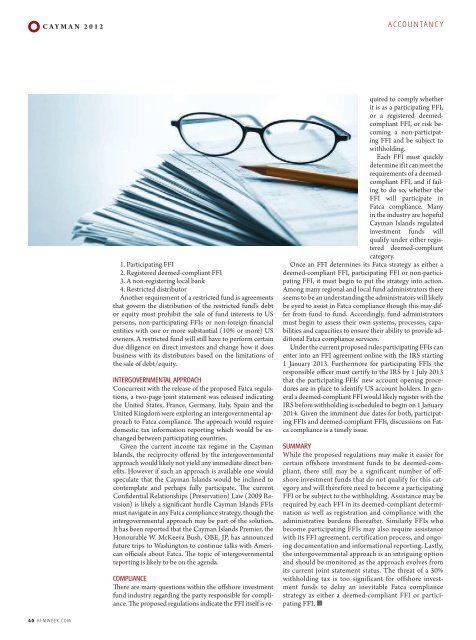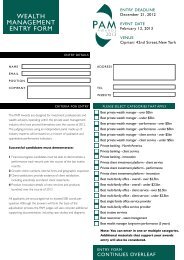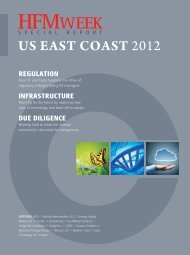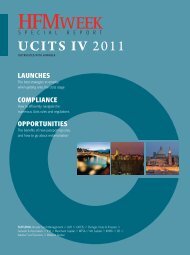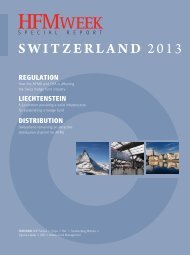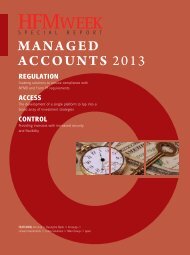CAYMAN 2012 - HFMWeek
CAYMAN 2012 - HFMWeek
CAYMAN 2012 - HFMWeek
- No tags were found...
You also want an ePaper? Increase the reach of your titles
YUMPU automatically turns print PDFs into web optimized ePapers that Google loves.
<strong>CAYMAN</strong> <strong>2012</strong><br />
ACCOUNTA NCY<br />
1. Participating FFI<br />
2. Registered deemed-compliant FFI<br />
3. A non-registering local bank<br />
4. Restricted distributor<br />
Another requirement of a restricted fund is agreements<br />
that govern the distribution of the restricted fund’s debt<br />
or equity must prohibit the sale of fund interests to US<br />
persons, non-participating FFIs or non-foreign financial<br />
entities with one or more substantial (10% or more) US<br />
owners. A restricted fund will still have to perform certain<br />
due diligence on direct investors and change how it does<br />
business with its distributors based on the limitations of<br />
the sale of debt/equity.<br />
INTERGOVERNMENTAL APPROACH<br />
Concurrent with the release of the proposed Fatca regulations,<br />
a two-page joint statement was released indicating<br />
the United States, France, Germany, Italy, Spain and the<br />
United Kingdom were exploring an intergovernmental approach<br />
to Fatca compliance. The approach would require<br />
domestic tax information reporting which would be exchanged<br />
between participating countries.<br />
Given the current income tax regime in the Cayman<br />
Islands, the reciprocity offered by the intergovernmental<br />
approach would likely not yield any immediate direct benefits.<br />
However if such an approach is available one would<br />
speculate that the Cayman Islands would be inclined to<br />
contemplate and perhaps fully participate. The current<br />
Confidential Relationships (Preservation) Law (2009 Revision)<br />
is likely a significant hurdle Cayman Islands FFIs<br />
must navigate in any Fatca compliance strategy, though the<br />
intergovernmental approach may be part of the solution.<br />
It has been reported that the Cayman Islands Premier, the<br />
Honourable W. McKeeva Bush, OBE, JP, has announced<br />
future trips to Washington to continue talks with American<br />
officials about Fatca. The topic of intergovernmental<br />
reporting is likely to be on the agenda.<br />
COMPLIANCE<br />
There are many questions within the offshore investment<br />
fund industry regarding the party responsible for compliance.<br />
The proposed regulations indicate the FFI itself is re-<br />
quired to comply whether<br />
it is as a participating FFI,<br />
or a registered deemedcompliant<br />
FFI, or risk becoming<br />
a non-participating<br />
FFI and be subject to<br />
withholding.<br />
Each FFI must quickly<br />
determine if it can meet the<br />
requirements of a deemedcompliant<br />
FFI, and if failing<br />
to do so, whether the<br />
FFI will participate in<br />
Fatca compliance. Many<br />
in the industry are hopeful<br />
Cayman Islands regulated<br />
investment funds will<br />
qualify under either registered<br />
deemed-compliant<br />
category.<br />
Once an FFI determines its Fatca strategy as either a<br />
deemed-compliant FFI, participating FFI or non-participating<br />
FFI, it must begin to put the strategy into action.<br />
Among many regional and local fund administrators there<br />
seems to be an understanding the administrators will likely<br />
be eyed to assist in Fatca compliance though this may differ<br />
from fund to fund. Accordingly, fund administrators<br />
must begin to assess their own systems, processes, capabilities<br />
and capacities to ensure their ability to provide additional<br />
Fatca compliance services.<br />
Under the current proposed rules participating FFIs can<br />
enter into an FFI agreement online with the IRS starting<br />
1 January 2013. Furthermore for participating FFIs the<br />
responsible officer must certify to the IRS by 1 July 2013<br />
that the participating FFIs’ new account opening procedures<br />
are in place to identify US account holders. In general<br />
a deemed-compliant FFI would likely register with the<br />
IRS before withholding is scheduled to begin on 1 January<br />
2014. Given the imminent due dates for both, participating<br />
FFIs and deemed-compliant FFIs, discussions on Fatca<br />
compliance is a timely issue.<br />
SUMMARY<br />
While the proposed regulations may make it easier for<br />
certain offshore investment funds to be deemed-compliant,<br />
there still may be a significant number of offshore<br />
investment funds that do not qualify for this category<br />
and will therefore need to become a participating<br />
FFI or be subject to the withholding. Assistance may be<br />
required by each FFI in its deemed-compliant determination<br />
as well as registration and compliance with the<br />
administrative burdens thereafter. Similarly FFIs who<br />
become participating FFIs may also require assistance<br />
with its FFI agreement, certification process, and ongoing<br />
documentation and informational reporting. Lastly,<br />
the intergovernmental approach is an intriguing option<br />
and should be monitored as the approach evolves from<br />
its current joint statement status. The threat of a 30%<br />
withholding tax is too significant for offshore investment<br />
funds to delay an inevitable Fatca compliance<br />
strategy as either a deemed-compliant FFI or participating<br />
FFI. n<br />
40 HFMWEEK.COM


